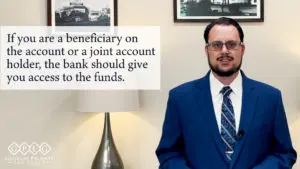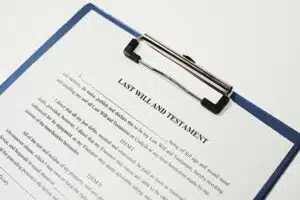As probate attorneys, one of the questions we often receive is related to how to claim the deceased’s bank accounts.
When a family member or a dear person dies, you might discover you are responsible for solving many problems. One of these duties can be accessing and closing the late person’s accounts (current accounts, savings, investments, checks, retirement accounts, etc.), especially if this money is needed to pay immediate expenses or outstanding debts of the deceased.
Closing a deceased person’s bank account can be simple or complex, depending on certain circumstances and factors.
Find out the answers to all these questions and more in this post about how to access the bank account of the deceased person.
Generally, a bank will only discuss account details with someone who has the legal right to access it. In an estate situation, the standard ways to get access to the deceased person’s bank accounts are:
If you are not joint account holder or a beneficiary, you will need to become the estate’s administrator or executor to gain access or information to the deceased person’s bank account. To get this legal authority, you need to file an appropriate petition with the probate court and be appointed by them as the estate’s legal representative.
If there is a will, it should indicate the person named by the deceased to become the executor of the estate. The named person in the will to fulfill the decedent’s last wishes will begin the probate estate process to become appointed as the executor. And receive the letters testamentary that give them the legal authority to claim deceased bank accounts, as well as gain access to the other late person’s assets.
If the deceased did not leave a will or the will is invalid, the family members will typically choose someone to serve as the estate administrator.
It is important to note that even if there is a will that identifies you as executor, the testament only gives you access to the deceased person’s bank account once it has been filed with the probate court, probated, and you have been appointed executor by them.
If you are a joint account holder or a beneficiary of the account, the financial institution should grant you access to the bank account funds without much more effort on your 
Most joint bank accounts include automatic rights of survivorship, meaning that when one account owner dies, the joint bank account rules apply, and the surviving joint account holders retain ownership of the money in the account.
The surviving account owner can continue using the account and withdraw funds without any interruptions.
If the bank account is solely titled in the name of the late person, then the bank account will be frozen, and the surviving heirs will be unable to access the account until the probate court has appointed an executor.
When having the legal authority to act in the estate’s name, the personal representative will have to require the funds to be released. However, you should know that the time to obtain them will depend on the sum of money in the account.
Before releasing any funds, the bank usually solicits legal documents. This happens because they have the legal obligation to ensure they are transferring funds to the correct person.
The bank will release the money once it is satisfied with the Grant of Probate.
Depending on the specific situation, there are more methods to access the money a decedent has in his bank accounts:
An heir-at-law may claim those assets by completing an affidavit for the financial institution without petitioning for Letters of Administration.
Under the Georgia State Law, which governs this situation, there are specific conditions for the financial institutions to pay the proceeds of such deposits directly to the persons who are so entitled.
***Please note that the bank is not required to provide the funds.**
This statute is permissive, and it is typical for a financial institution only to provide bank account funds once the probate court appoints an estate personal representative.
This procedure is not commonly used as strict criteria exist for when it can be used. As probate lawyers, we have found that, in practice, this petition is not very useful. It looks like it would save time, but it often results in more complications than a standard probate estate process.
If you want to use this probate petition, here are the eligibility requirements that must be met:
If these conditions are met, it may be possible to petition for no administration necessary.
The most common way to access the deceased’s bank accounts is to go through the typical probate process.
This means appointing a personal representative over the deceased person’s estate and administering the inheritance correctly and legally.

There are a few steps to take to access a deceased’s bank account:
You might need to present these banks with verifiable documentation to prove you have a legal right to ask about and access the bank account after death.
The next step is contacting the bank and accessing the decedent’s bank account.
For this, you need to follow the steps specific to every situation: if there is or there is not a will, if the late person was the exclusive owner of the bank account, or if it was a jointly owned account, to name just a few.
To answer this question, you should know if the estate has been opened in probate court and if the executor is appointed over the estate.
If the probate court has appointed the named executor and they have received a court order stating that they are legally authorized to act in the estate name, then they will have the ability to gain access to the deceased’s bank accounts.
The executor has to open an estate bank account, and any funds related to the deceased’s assets should be deposited into this account. If there are any checks for the estate or in the name of the deceased, they should be turned over to the estate’s personal representative to be deposited into the estate account.
Please note that if there are co-executors, both must sign each check.
No, if the probate court has not designated the named executor as the appointed executor, then they cannot gain access to the deceased’s bank account unless they are listed as a named beneficiary or joint holder on the account.

If the bank account has a beneficiary or joint owner on the account, they will gain access to the account after the account owner dies.
When someone dies, they might leave or not a last will or a testament, in which they stipulate the last wishes, names the beneficiaries of his bank accounts or different estate assets, and the estate executor.
If the late person passes away with or without a will, but his bank accounts don’t have named beneficiaries or joint owners, they will be part of the deceased’s estate and go through the probate process.
If you die without naming a beneficiary or designated heirs, state probate law applies.
If the bank account is a true joint account and one of the holders passes away, the account becomes the property of the surviving joint account holders.
Payable-on-Death is also known as POD.
If there is a POD beneficiary on a bank account and the bank account holder dies, the funds will be given to the POD beneficiary.
The financial institution may require the beneficiary to provide documentation such as a decedent’s death certificate and other documents before allowing them to withdraw money.
Unless there is a beneficiary, POD, or joint account holder on the deceased’s account, no one should withdraw money from the deceased’s bank account.
Once the probate process has been opened and the probate court appoints a personal representative, they will have access to the funds and place them into an estate account.

After the deceased has passed away, contacting the financial institution holding the deceased’s bank account and inquiring about a potential beneficiary is an excellent first step.
Yes. In general, it is a complex legal process, but there are methods to attempt to contest the beneficiary. Such cases are typically heard in a higher court.
Before moving forward with contesting the designated beneficiary on a bank account, it’s essential to ensure that you have standing and a valid reason for disputing the beneficiary designation.
Whether the decedent was unduly influenced or there were mistakes within the beneficiary designation form, it’s generally the contesting party’s responsibility to produce proof.
There are various possible reasons why an interested party might want to challenge the beneficiary of the deceased’s bank account after the account holder’s death. However, this can be a complex legal process, and we recommend that an experienced probate attorney assist you.
Lack of capacity, forgery, fraud, incompetence, undue influence, and improper execution or mistake are just a few possible reasons.
Any interested party may attempt to contest a bank account beneficiary. We suggest contacting our office to speak with a team member if this situation applies to you because it is a complex legal situation.
It is illegal to continue to make payments, withdraw money, or use the bank account of a person who has died without following the correct legal process.
Being named in the will as a personal representative does not automatically authorize you to act as executor; you must wait for official confirmation before acting on behalf of the estate. Otherwise, you will risk liability for any damage caused to the patrimony by the legal doctrine of the tortious executor.
An executor of son tort translates as “executor of his mistake”.
This term refers to a person who wrongfully interferes with or converts the property(s) of an estate. Doing so in bad faith can make the executor liable to the heirs or beneficiaries for up to double the property’s value.
The punishment for illegally taking money from a deceased account can vary significantly based on the jurisdiction and specifics of the offense. Such action is generally considered theft, and the sentences can include restitution, fines, and potential imprisonment.
The rigor of these penalties is generally proportional to the sum of money that was taken. Fraud penalties also often include fines, imprisonment, and potential civil lawsuits from other affected parties. In summary, abiding by the legal processes associated with deceased individuals’ accounts is crucial to avoid such penalties.
Managing a loved one’s estate when they die can be a challenge, especially if they didn’t leave a will or opened multiple bank accounts. It can also be confusing to deal with different types of debt, so it’s essential to talk to family and close friends if you need help.
What are the bank account beneficiary rules to be aware of? What if no beneficiary is named on a bank account? Can you dispute a bank account beneficiary? Although it is common for such questions to arise after the death of a loved one, the answers are not always so simple.
With the support of a probate attorney, you can be sure that if problems arise, your beneficiary rights are violated, or you don’t know how to claim deceased bank accounts, they will be able to resolve them. You can also reach our office at (770) 796-4582 to set up a consultation.
Disclaimer These websites have not been reviewed by Georgia Probate Law Group and are not endorsed or even recommended by Georgia Probate Law Group. These websites are additional resources that you can use to further your general education on this topic.
Disclaimer: The information above is provided for general information only and should not be considered legal advice. Our probate attorneys provide legal advice to our clients after talking about the specific circumstances of the client’s situation. Our law firm cannot give you legal advice unless we understand your situation by talking with you. Please contact our law office to receive specific information about your situation.
Compassionate listeners, knowledgeable guidance. Schedule a free consultation with our team and let us help you and your family with your legal concerns.
GET IN TOUCH 770-796-4685Learn Important Probate Essentials, including key things that go wrong in an estate, how to prevent them, and what to do if they happen.



© 2025 Georgia Probate Law Group by Broel Law, LLC. All rights reserved.